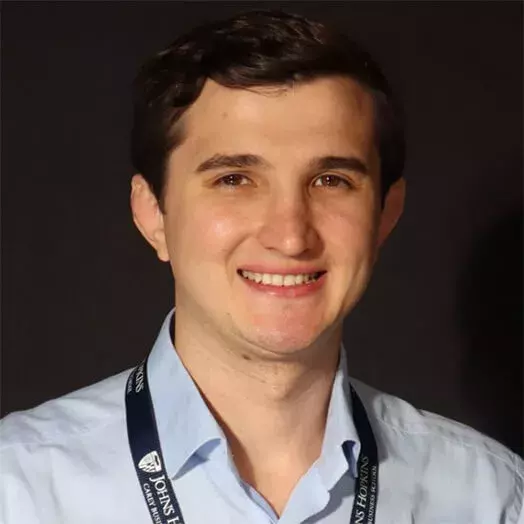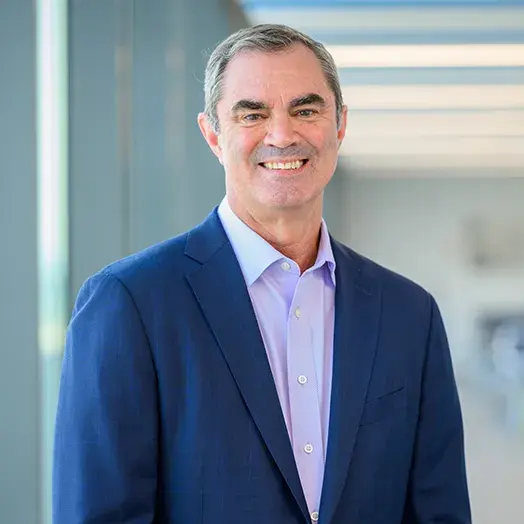Carey students participating in the Milan global immersion got a firsthand look at how European health systems compare to the U.S. model, all while building a global perspective, exploring digital transformation in the industry, and growing their professional networks.

Milan immersion offers Carey students first-hand experience with European health care models
What can the Italian health care system teach future business leaders about global health care models, innovation, and market strategy? That’s the question at the heart of the Milan global immersion, an experiential learning opportunity that took Johns Hopkins Carey Business School MBA students to Italy to explore the complexities of European health care.
Led by Professor of Economics Mario Macis, the course Health Care in Europe: Models, Regulation & Business offers students a firsthand look at how European health systems compare to the U.S. model. Through academic sessions, site visits, and discussions with industry leaders, students examined the interplay of public and private health care, regulatory frameworks, and business strategies in the sector.
Why Milan?
Milan serves as an ideal backdrop for this exploration, as Italy’s health care system embodies key characteristics shared by other European models. With universal insurance and a national health service, Italy offers a unique lens into public health care funding, cost control strategies, and the challenges of an aging population.
Hands-on learning with industry leaders
During their time in Milan, students engaged with leading health care institutions, including:
- Niguarda Hospital: One of Italy’s top public hospitals, known for its cutting-edge medical treatments, research initiatives, and patient-centered care. Students explored hospital management and operational efficiency, gaining a unique perspective on large-scale public healthcare delivery.
- Bracco: A global leader in medical imaging contrast agents, Bracco provided insights into R&D-driven growth, global market expansion, and the challenges of operating in a highly regulated industry.
- Zambon: This Milan-based pharmaceutical company and its associated life sciences campus, Openzone, highlighted the role of corporate innovation and ecosystem collaboration in biotech, pharma, and medtech.
- Osservatori Digitali at Milan Politecnico: Students participated in a strategy challenge tackling real-world digital health problems, exploring AI-driven diagnostics, treatment advancements, and market access hurdles.
The week-long immersion also included a day trip to Bologna, further broadening students’ perspectives with insights from academic leaders. At Johns Hopkins University SAIS Europe, they engaged with Senior Fellow of Global Health Ilaria Capua on pressing global health challenges. Professors Chiara Binelli and Laura Sartori from the University of Bologna provided insights into AI applications in health care, reinforcing the immersion’s focus on digital transformation in the industry.
Bridging global health care and business
A key takeaway from the immersion was the importance of understanding diverse health care models to drive innovation and efficiency.
“By comparing systems like Italy’s universal public health care with the private-public mix in the U.S., students can identify best practices, cost control strategies, and policy trade-offs,” said Macis. “This knowledge is critical for future health care leaders navigating international markets and shaping sustainable solutions.”
The experience was particularly valuable for dual-degree students, many of whom brought deep knowledge of the U.S. health care system. Their perspectives enriched discussions, and they were able to critically assess the implications of different regulatory environments and market strategies.
What to Read Next

alumni success
Innovative cancer therapy platform among “Most Disruptive Startup” listA transformative experience
Beyond its academic and professional benefits, the Milan global immersion offered students a chance to experience Italy’s vibrant culture while building a global professional network.
“The site visits provide an opportunity to tackle real-world business problems in digital health, while networking sessions connect students with peers from other programs. Through engaging with industry leaders, students deepen their understanding of global health care markets and the intersection of business and medicine,” said Macis.
As the business of health continues to evolve, understanding international health care models is more crucial than ever. Through immersive experiences like this, students gain the global perspectives and strategic insights needed to lead in the rapidly changing health care industry.


